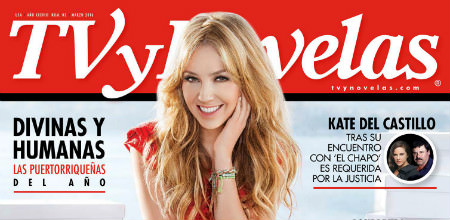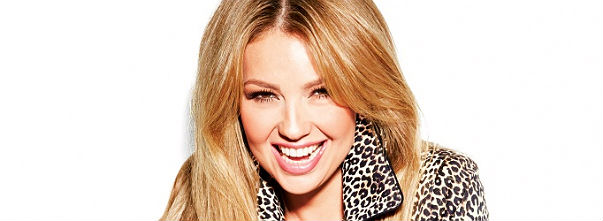NEW YORK (AP) – It's no secret that Thalía has savored the honey of love and success in the same way she has lived through moments of great pain. The Mexican superstar grew up under the spotlight and the press has been in charge to document everything and more about her life.
What the public does not know is what was on the mind of Thalía at age 6, when the death of her father caused her such a shock that she did not make a sound for a year. Or what harbored the feelings of guilt after the kidnapping of her sisters in 2002 and how she handled it. Or how her current husband Tommy Mottola won her heart.
In her new book Cada día más fuerte (on sale this week and available on November 1 in English as Growing Stronger), the singer and actress reveals her most personal struggles while reflecting on what she considers her greatest blessings: Mottola and their children Sabrina and Matthew.
"It's a very intimate book, where I'm exposed to a thousand, where there is no mask, where there is no angle that remains guarded," Thalía said Wednesday in an exclusive interview with The Associated Press.
With her long hair down, minimalist makeup without any accessories, the star spoke enthusiastically about this and other chapters of her life, putting in laughter and tears when remembering her mother, Yolanda Miranda, who died just last May a month before the birth of her son. She also explained why she thanks the La Llorona having made a girl able to face the unknown.
"My life has been wonderful," sums Thalía. "Every moment has made me a stronger person, a gladiator."
Following are excerpts from the interview.
The Associated Press: What led you to write this book at this point in your life?
Thalía: It's a moment in which I am very sure of who I am, very accepted, very peaceful, happy with the things I've done in my life, both personally and professionally, and I thought it was an important time to share my story, my experiences both good and bad, with everyone… and treat it in some way my experiences can support the lives of others.
AP: You approach very happy subjects, like your successes, your marriage, your children. But you also delve into very painful subjects… How difficult was it for you to make this trip to the past?
Thalía: I was exposed and I was vulnerable … It was very difficult to put my life on paper, was a very intimate, very psychological, but also was liberating. It was like cleaning the closet, like cleaning the house, like throwing at walls, opening new spaces, and it was very refreshing to my life.
AP: You feel that you made catharsis with this book?
Thalía: Yeah (laughs). I definitely suddenly had catharsis on topics that I currently do not want to get involved, did not want to scratch a little bit to see what was there.. And this book gave me the opportunity to really rescue a woman, as a human being as a child, as an artist and helped me to restructure mentally, psychologically, physically, spiritually, and be bright, be clean, be ready for a new adventure my life.
AP: What were these subjects difficult to address?
Thalía: I think my life in general, like any other human being, has high and has low, has moments of great light, moments of great darkness. In my case I feel suddenly that there have been two extreme moments: moments of too high or too low. And I thought it was an opportunity for me as a human being to grow, to learn, to share these stories and also as someone else say, "there is opportunity to feel or in spite of a tragedy, there is chance to turn, or to revert, the sadness, the pain, the solitude, the abandonment, the death, in a positive experience of learning, of spiritual growth."
AP: You were pregnant when you wrote this book. With the hormonal changes you are usually more susceptible. Do you feel that this helped you in some way to express yourself with your heart in your hand?
Thalía: Yeah. Definitely being pregnant while I worked on the book was an element of excitement, of opening totally internal in a very maternal, very open, very alive. When one is expecting you feel full of life, you feel full of joy, you feel full of fantasy stories. And it was the specific moment in which fate put this book in my way.
AP: Your mother have read the book and even help you edit, writes in the prelude. What did she say to you? How did you take it?
Thalía: Well, the book was finished and my mom came to visit me a week before it happened. I gave her the manuscript. I said, "Here is the book to see what you think of it." And not only read it once, but finishing the last page to read it again. And began to remember the stories. And we started adding stories that were left out. We started to laugh. And then we begin to cry. It was a very important moment for me because she also had the opportunity, the week before she departed, to relive her life, to relive all the moments in which we were together, from our home, from my birth, my father, my sisters when we are young, all that magical and wonderful home, to my career, our moments, our moments of triumph, glory. It was for her too, that to visit to her past, like closing a whole cycle. And I keep quiet about it, because I know that somehow if something was pending in this life, perhaps this book she also closed several cycles.
AP: We know you were very attached to her, talking on the phone every day... What do you miss the most?
Thalía: Well just that. Every day is like trying to dial a number and nobody answers. Getting to a place and say, "I will send a message", (and) who no longer send a message. There is no one to share these things like ours, so intimate. Yes there is this energy, it does exist, because I think that nobody is born, no one dies, one is eternal. One is an energy that is transformed, even when you leave this world… But the fact of not being here physically, that's what hurts: can not hear that voice, not being able to hug that person, to smell that natural perfume… That's what I'm working, not day to day or hour to hour, but minute by minute, and I'm trying to get stronger every day.
AP: What you're saying about the energy that reminds me of at the beginning of the book, when you recounts a meeting when you was a girl with La Llorona, to whom you even thank her and even have made you a brave woman.
Thalía: Actually in our culture, Latinos, we know exactly who is La Llorona (laughs). There will always be the ghostly character in the stories of our Latino families, in our house and such a character really did exist. I even talk in the book that the house was built on a cemetery, then suddenly I felt strange supernatural powers and the little girl whether she likes it or not, want to or does not want to defend herself from the invisible thing. And what else in our race or in our lives as human beings, there are always things that one imagines that terrifies you, frightens you, and it is important to face and deal with them is what I mean in that chapter. We must face our ghosts, and dissipate!







